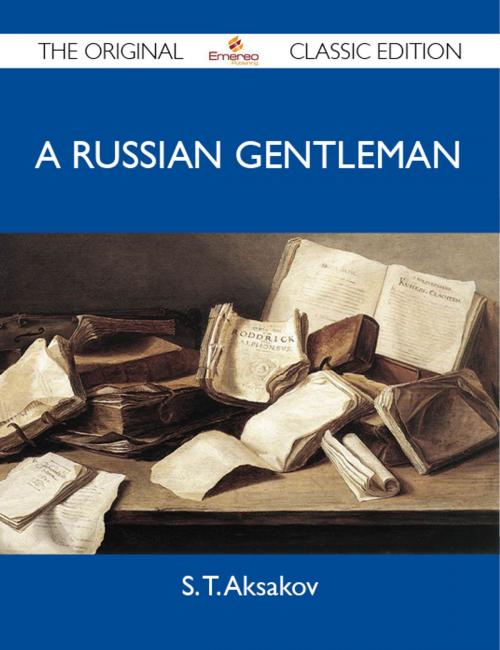A Russian Gentleman - The Original Classic Edition
Nonfiction, Reference & Language, Reference, Fiction & Literature| Author: | Aksakov S | ISBN: | 9781486414536 |
| Publisher: | Emereo Publishing | Publication: | October 24, 2012 |
| Imprint: | Emereo Publishing | Language: | English |
| Author: | Aksakov S |
| ISBN: | 9781486414536 |
| Publisher: | Emereo Publishing |
| Publication: | October 24, 2012 |
| Imprint: | Emereo Publishing |
| Language: | English |
Aksakov refers to himself not as a novelist but as a chronicler of oral tradition, and the book very strongly retains that feel throughout, bringing us more intimately into the concerns and struggles within the family than an author who only had recourse to his or her imagination realistically could. While most of the characters are fairly well-drawn, the two most memorable ones are Stepan and Aksakovs mother (named Marya in real life and Sofya in the book), the latter of whom shows a great deal of both familial devotion and intelligence without ever seeming to be unrealistically glorified.
The portrayal of Stepan (the Russian Gentleman whom translator J.D. Duff chose to recast as the title character) seems a little more suspect, which is unsurprising since Stepan died when Sergei was five years old, so that Sergei had to rely almost exclusively on questionably-accurate oral accounts of Stepans doings many years after the fact in order to get a sense of his character. Throughout the work, pretty much all of Stepans attributes are carried to at-times implausible extremes. Early on, Aksakov portrays Stepan during his angry spells as nothing less than a madman who obliges his whole family to hide from him for days on end, but at the same time as a brilliant judge of character (which Sergei seems to extrapolate merely from the fact that Stepan was the only member of the household to disapprove of Parashas husband and to approve of Sofya). In the last sketch, Stepan doesnt even care whether his granddaughters live or die but dreams constantly of a grandson; while Stepan was surely eager to have his noble and ancient name carried on, one gets the sense that the picture painted in the book is more a reflection of the vanity of the author (who was Stepans first grandson) than of Stepans actual feelings (at least, one hopes so).
All the same, part of the charm of oral tradition lies in the exaggeration that comes along with it, and the particular items which get exaggerated can tell us a good deal about the psychology of the storyteller and the values of the culture. As such, A Russian Gentleman gives us an enjoyable and informative glimpse at life among the traditional middling gentry in Imperial Russia at a pivotal point in that countrys history.
Aksakov refers to himself not as a novelist but as a chronicler of oral tradition, and the book very strongly retains that feel throughout, bringing us more intimately into the concerns and struggles within the family than an author who only had recourse to his or her imagination realistically could. While most of the characters are fairly well-drawn, the two most memorable ones are Stepan and Aksakovs mother (named Marya in real life and Sofya in the book), the latter of whom shows a great deal of both familial devotion and intelligence without ever seeming to be unrealistically glorified.
The portrayal of Stepan (the Russian Gentleman whom translator J.D. Duff chose to recast as the title character) seems a little more suspect, which is unsurprising since Stepan died when Sergei was five years old, so that Sergei had to rely almost exclusively on questionably-accurate oral accounts of Stepans doings many years after the fact in order to get a sense of his character. Throughout the work, pretty much all of Stepans attributes are carried to at-times implausible extremes. Early on, Aksakov portrays Stepan during his angry spells as nothing less than a madman who obliges his whole family to hide from him for days on end, but at the same time as a brilliant judge of character (which Sergei seems to extrapolate merely from the fact that Stepan was the only member of the household to disapprove of Parashas husband and to approve of Sofya). In the last sketch, Stepan doesnt even care whether his granddaughters live or die but dreams constantly of a grandson; while Stepan was surely eager to have his noble and ancient name carried on, one gets the sense that the picture painted in the book is more a reflection of the vanity of the author (who was Stepans first grandson) than of Stepans actual feelings (at least, one hopes so).
All the same, part of the charm of oral tradition lies in the exaggeration that comes along with it, and the particular items which get exaggerated can tell us a good deal about the psychology of the storyteller and the values of the culture. As such, A Russian Gentleman gives us an enjoyable and informative glimpse at life among the traditional middling gentry in Imperial Russia at a pivotal point in that countrys history.















